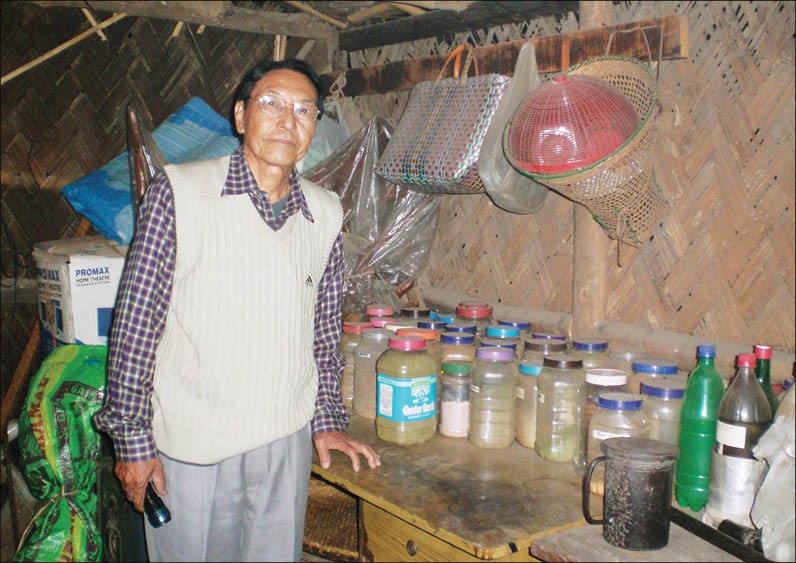N. Imti Ao (NCS. Retd) displays the herbal plant items all stored in containers and kept intact before final production. (Morung Photos)

Akangjungla Longchar
Dimapur | November 22
The practice of harnessing herbal and traditional medicines and the natural treatment it offers for various ailments has led to even the World Health Organization (WHO) calling for its member states to integrate traditional medicine into their national health systems. While the role of traditional medicine in healthcare systems is something that the government must recognize and take forward, Nagas are by tradition and practice, already well accustomed to using valuable herbal plants, rare plant species for making traditional medicine.
One such advocate of traditional healing is the Dimapur-based Retired NCS officer N. Imti Ao who is also a former general secretary of the Naga Council. Imtisangba, as he is popularly known, is popularizing the use of herbal medicine. While his accomplishments may not be making waves in the public’s eye, yet for close friends and well wishers, Imtisangba is now a known name when it comes to his herbal treatments for patients suffering from various ailments.
N. Imti treats patients with indigestion, chronic dysentery, diabetes and even some with kidney and bladder problems. “If you take my medicine, I can assure positive result; one will hardly suffer from food poisoning,” he says. Besides working as an Advocate, N. Imti is promoting herbal treatment as he believes “it is the most ancient form of treatment and even our forefathers has been practicing it without any side effect.”
Hailing from Lirmen village in Mokokchung District Imtisangba served as the Deputy Resident Commissioner of Nagaland House in New Delhi. He started taking keen interest in herbal medicine, especially inspired by his Bengali friends and other doctor friends while working together in Delhi. However, he got seriously involved in traditional medicine and cure when his late wife was diagnosed with a heart problem. “I had no option but to create interest in medicine. I got involved in medicine because of my situation,” Imtisangba recollects. He started reading books including ‘Plants that heals’ by Dr. J. C Kurian to gain knowledge about plants and their medicinal value.
Today he has a vast collection of herbal plant items at his private residence which are used to make medicines. His production are generally for own use and ‘hardly for commercial purposes though there is demand in the market.’ N Imti Ao has completed 10 years practicing herbal treatment with his ‘secret mission—to do something for someone’ and he hopes that the upcoming generation will not lose touch with the indigenous knowledge of herbal treatment but find ways to identify herbal plants, preserve it and put it to use.
Interestingly as mentioned earlier, the WHO has taken a formal declaration on the role of traditional medicine in formal healthcare systems and highlighted the progress, challenges and future direction of its development. It also recognized traditional medicine as one of the resources of primary healthcare services to increase availability and affordability, as well its contributions in improving the health of those targeted in the UN’s millennium development goals.






